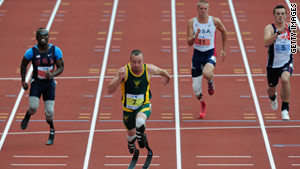There has been much argumentation about whether it's fair or not. Some people thought/think that it would give him an unfair advantage (i.e. the prostheses would make him run faster). I read this explanation by a doctor.
He highlighted one major disadvantage to having prosthetic limbs.
Even odder are the claims that runners on prosthetic limbs aren't as subject to injuries, given that they are missing feet, ankles and sometimes knees as well. Tell that to anyone that's ever been to a prosthetics clinic and dealt with the numerous complications of fit and form the imperfect technology leaves us with. There is endless tinkering to get things right. The statistics bear this out: Paralympic athletes endure nearly 60% more injuries than able-bodied runners.What I most liked was a comment on the "normal" body in society.
Every "unadulterated" athlete has different biomechanical properties. Some have longer limbs, denser bones, slipperier tendons and double joints. The speed with which your body can clear the acid byproducts of metabolism and carry oxygen to your mitochondria are affected by cardiovascular training to be sure (confirmed), but there is a basic inequality set up by our very genetics.
In an 2008 NBC Sports promotional video, "Michael Phelps: Perfect Body," Bob Costas took this line of thought to an uncomfortable new level, describing the swimmer's physical features like his long upper body that forms a "sculpted V shape" and his "flat backside" as if he were a prize thoroughbred and praising his "superior genetics." The Olympics have always had this connection to body worship in a way, if only with fewer pan and zoom effects. Costas was in well-trod territory. At least our modern games are not performed in the nude.

No comments:
Post a Comment